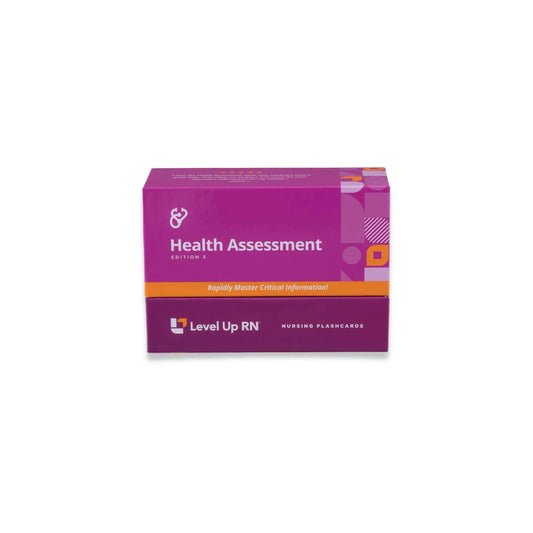Types, qualities, and some possible causes for adventitious breath sounds (e.g., fine crackles, coarse crackles, wheeze, rhonchi, friction rub).
Health Assessment, part 33: Adventitious Breath Sounds
Full Transcript: Health Assessment, part 33: Adventitious Breath Sounds
Full Transcript: Health Assessment, part 33: Adventitious Breath Sounds
Hi. I'm Meris, and in this video, I'm going to be reviewing with you different types of adventitious sounds, including their qualities and possible causes. I'm going to be following along using our health assessment flashcards. These are available on our website, leveluprn.com, if you want to grab a set for yourself. Or if you are more of a fan of digital products, I would invite you to check out Flashables, which is the digital version of all of our flashcards. All right. Let's go ahead and get started.
So today I'm going to be talking to you about different types of adventitious, which means unexpected, breath sounds. These breath sounds include fine crackles, coarse crackles, wheeze, rhonchi, and friction rub. So let's go ahead and talk about them. And I want to call your attention to this card in the health assessment deck, which has a nice table that shows all of the different sounds, their sound quality, and possible causes.
So first up, we're going to talk about fine crackles. And fine crackles, I always explain to new nurses that it is similar to the sound that if you took some hair between your fingers and rubbed that hair together in front of your ear, that is what fine crackles sound like. They're high-pitched. They are brief popping or crackling sounds. And what this indicates here is that there is fluid collecting in small airways.
Now, compare this with coarse crackles. Fine usually means small, whereas coarse means big. So in this instance, we are talking about low-pitched, longer, bubbling or popping sounds. And again, this is the same cause. We've got fluid in the airway that is being percolated. It's being mixed with air as we breathe in and out. But in this case, coarse crackles would be caused by fluid collecting in the larger airways. Now, what does coarse crackle sound like? This is not like the hair in front of your ears. A coarse crackle is similar to if you were to blow bubbles into a glass of milk with a straw. It's those big, popping, bubbling noises.
Okay. Now moving on to wheeze. Wheeze is a whistling, a musical, sort of a squeaking noise. And what we are hearing here is that we have narrowing of the airways. So think about how if I whistle, right, that is because I have a narrow space for air to escape from. So similarly, if I have constriction in my airways throughout my lung fields, I'm going to have a narrowed airway where the air passing through is going to create this kind of musical whistling sound. And this is called a wheeze. Very commonly, this is associated with your patients who are experiencing an acute asthma attack, although there can be other causes as well.
Now, when we talk about rhonchi, rhonchi is this low-pitched snoring or rattling sound. And the way I think of this is it's kind of that sound, if you've ever heard it, where you've got some phlegm, some mucus in your chest, and you kind of have that-- you inhale, and you hear it sort of rattling around in there. So this is caused by secretions or some form of obstruction in the larger airways. Very commonly, if you hear rhonchi, you can just instruct your patient to sort of give it a little throat clearing or a little coughing action, and that should clear that secretion from the airway.
And lastly, I want to talk to you about friction rub. Now, friction rub is described as a loud grating or a rubbing sound. And a frequent cause of this is going to be when you have two layers of things that are inflamed and rubbing together. Now, where do I have two layers of things? Well, here we're listening to the lungs. So I'm talking about the visceral and parietal pleura. The pleura are the membranes lining either the lung itself or the chest wall. Visceral pleura is going to line the organ itself, the viscera, and the parietal pleura is going to line the chest wall.
These two should just be sliding back and forth across each other as I inhale and exhale. And there shouldn't really be any friction there. However, if those two membranes-- if those membranes get inflamed, they're going to rub on each other and cause this friction, this rubbing, right? They're not smoothly gliding anymore. This is that very weird kind of squeaking, rubbing noise. And I always think about it as have you ever dragged a plate against the table? You're trying to pull it closer to you, but it makes a terrible noise. That's a friction rub, except it's happening on a smaller scale inside my lungs.
All right. So that is it for this review of adventitious breath sounds, but I'm so glad you stayed until the end because I'm going to test your knowledge of some key facts I provided in this video with some quiz questions. Low-pitched bubbling or popping sounds should be documented by the nurse as which type of adventitious breath sounds? Coarse crackles. When auscultating the lung fields of a patient suffering from an acute asthma attack, what adventitious sound does the nurse anticipate hearing? Wheezing.
All right. That is it for those quiz questions. Let me know how many you got right in the comments. I want to hear. If you've got a great way to remember something, please leave me a comment. I want to see it, and I know that other learners will benefit from it as well. I'll see you in the next one. Thanks so much, and happy studying.


